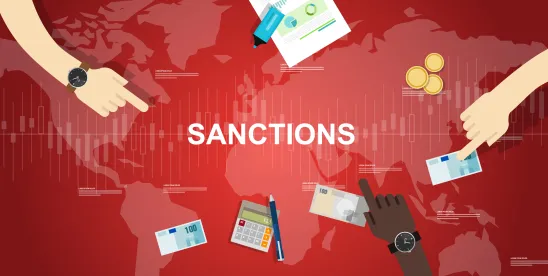On 24 September 2024, the G7 released updated guidance on the prevention of evasion of export controls and sanctions imposed on Russia. The aim of the guidance is to “assist industry in identifying Russian evasion practices and complying with Global Export Control Coalition controls, thereby protecting their technology from misappropriation, preventing reputational harm, and mitigating liability risk while supporting the continued success of our export controls and sanctions.”
This briefing provides an overview of the guidance and K&L Gates’ top tips for sanctions compliance and preventing sanctions evasion:
Understand Russia’s Diversion Tactics and Adopt Appropriate Measures to Limit the Risk of Illicit Procurement Efforts
The G7 has stated that Russia has relied on deceptive tactics to avoid export controls and sanctions enforcement. As such, all parties of the supply chain need to be aware of the diversion tactics which may potentially be utilised by Russia and should implement measures to mitigate such risks.
The steps taken by Russia, as detailed in the G7 guidance, include the following:
- Authorising federal agencies to seize Russian assets owned or managed by foreign persons from “unfriendly states”;
- Requiring certain organisations, including those in infrastructure, to offer the Russian Federal Security Service unrestricted access to their resources for monitoring purposes;
- Allowing Russian parties to maintain access to foreign intellectual property without the consent of the trade mark holder;
- Restricting dividend transfers to foreign bank accounts by anyone from “unfriendly states” and imposing requirements that payment only be in Russian rubles to a specific type of account at a Russian bank;
- Requiring all those connected to “unfriendly states” to gain approval from the Government Commission on Control over Foreign Investments for all transactions with participatory interests in, or those that result in management rights over, Russian limited liability companies; and
- Adding “Information on the Russian export or import of dual-purpose products subject to export control, a premature dissemination of which may compromise national security” to the list of information that is considered a state secret.
Familiarise Yourself With the Common High Priority List (CHPL)
The CHPL highlights items that pose the highest risk of illegal diversion to Russia owing to their significance to the Russian war effort. Therefore, close attention should be given to any systems and controls in supply chains to ensure such goods are not diverted or re-exported to Russia.
The CHPL lists 50 “tariff lines” that are split into four tiers and categorised by Harmonised System Codes that are known to exporters, shippers and freight forwarders around the world.
Examples of items on the list include (although are not limited to): electronic integrated circuits, radio navigational aid apparatuses, static converters, mounted piezoelectric crystals, ball bearings, printed circuits and machining centres for working metal.
See here for the full CHPL.
Recognise the Red Flags
Corporates and individuals should be alert to the following red flags that may be indicative of potential export control and sanctions evasion:
- Sudden changes in business activity (in particular if this occurred after the Russian invasion of Ukraine);
- Inaccurate, missing or false information;
- Concealment of end users;
- Inconsistencies and irregularities in transactions;
- Ambiguous details;
- Dividing the value of an invoice into smaller payments;
- Questionable customer information;
- Suspicious client connections;
- Last-minute changes to parties involved;
- Payments from entities located in third countries not involved in the transaction; and
- Reluctance from clients to provide certification that it will not sell to sanctioned parties.
Whilst this is not intended to act as a fully comprehensive list, it should provide a useful point of reference when assessing if suspicious behaviour is indicative of potential export control and sanctions evasion.
Note, a single flag in isolation is not necessarily sufficient to reach a definitive conclusion regarding illicit activity, and so the surrounding facts and circumstances should be borne in mind.
This may require further enquiry or due diligence to be undertaken.
Enhance Due Diligence When Red Flags are Identified
If businesses encounter any of the above (or any other red flag indicators), they should conduct enhanced due diligence to mitigate any attempts to evade export controls and sanctions.
It is specifically advised that businesses do the following upon encountering any red flags:
- Check those involved against applicable sanctions lists;
- If necessary, check the parties against information provided by nonprofit organisations that identify high-risk companies;
- Inquire with the counterparty about the context of any shipment, in particular with respect to the end use, end user, and ultimate country of destination for the item;
- Conduct internal research into the counterparty (and other entities and individuals involved in the transaction);
- Include contractual provisions in distributor agreements to require all distributors to impose increased due diligence measures and comply with relevant sanctions regimes; and
Having conducted this further due diligence, businesses should analyse and re-evaluate the red flag indicators to assess whether to refrain from the transaction. In certain instances, businesses may be required to disclose information to the relevant enforcement and compliance agencies.
Key Takeaways
The G7 has stated that Russia has become progressively advanced and sophisticated in its means of evading export controls and sanctions. As such, it is more important than ever to bolster efficient processes and procedures that prevent such potential illicit practises. In doing so, companies will also decrease any risk of finding themselves in a position where they may facilitate prohibited activities and possibly violate sanctions prohibitions.





 />i
/>i

